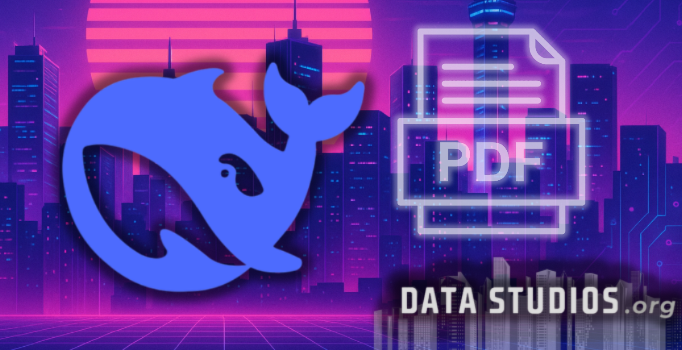Using DeepSeek to Read and Analyze PDFs: Complete Overview
- Sep 20, 2025
- 4 min read

DeepSeek has rapidly evolved into one of the most advanced open-source AI platforms, offering robust tools for reading, summarizing, and analyzing PDF files. With models like DeepSeek-R1 and DeepSeek-V3, users can process PDFs through direct uploads, build custom chatbots for interactive document queries, or integrate DeepSeek into automated workflows for large-scale document management. Its versatility makes it a strong solution for research, corporate analysis, education, and enterprise-grade knowledge systems.
Direct PDF uploads in DeepSeek apps
DeepSeek supports native PDF ingestion in its web and mobile chat interfaces, including ChatDOC and other compatible platforms. Users can:
Upload PDF documents directly for summarization and interactive Q&A.
Provide PDF URLs to fetch and process online documents automatically.
Combine multiple PDFs in a single session and cross-reference information during queries.
In addition to PDFs, DeepSeek apps support formats like DOCX, TXT, Markdown, EPUB, and JSON, making it suitable for diverse document analysis needs.
Using DeepSeek with retrieval-augmented generation (RAG)
One of DeepSeek’s most powerful approaches for PDF analysis involves RAG pipelines, which enable the creation of custom chatbots capable of answering detailed questions about document content:
Extract text from PDFs using integrated plugins or preprocessing tools.
Store document embeddings in a vector database like FAISS for efficient retrieval.
Use DeepSeek-R1 or DeepSeek-V3 as the reasoning engine to provide answers grounded in uploaded documents.
Deploy chatbots with Streamlit interfaces for real-time, context-aware interactions.
This method is widely adopted by research teams, enterprise data managers, and developers who require precision in handling large collections of documents.
Local PDF analysis with DeepSeek R1 and Ollama
DeepSeek also supports fully local deployments, enabling secure and private PDF processing:
Ollama integration allows users to run DeepSeek-R1 on personal machines, ideal for environments with strict data governance policies.
PDFs are processed locally by extracting text before feeding the content into the model for summarization or querying.
Community-driven enhancements now support multi-file ingestion workflows for organizations managing extensive libraries of sensitive reports.
By combining DeepSeek R1 with local environments, users can maintain full data privacy while leveraging high-performance AI capabilities.
Automating PDF workflows with DeepSeek
For advanced users, DeepSeek integrates seamlessly into automated pipelines using tools like n8n or custom APIs:
Monitor shared folders for new PDF uploads and trigger automatic ingestion.
Summarize key findings or extract structured data points from incoming reports.
Push insights to productivity platforms like Google Sheets, Notion, or Slack.
Set up daily or weekly batch-processing tasks for corporate archives and research repositories.
This automation transforms DeepSeek into a scalable document intelligence system, minimizing manual effort and enabling rapid access to critical insights.
DeepSeek R1 and V3 model capabilities for PDF analysis
DeepSeek’s performance on PDFs is powered by two flagship models—DeepSeek-R1 and DeepSeek-V3—each optimized for different workflows.
DeepSeek-R1 (released January 2025)
Open-source and MIT-licensed, making it free to deploy locally or integrate into apps.
Optimized for reasoning-heavy tasks, such as analyzing contracts, legal filings, or technical white papers.
Supports multimodal inputs, including textual content extracted from PDFs alongside charts or structured data.
Highly efficient on consumer GPUs due to quantization support (4-bit and 3-bit compression).
DeepSeek-V3 (Mixture-of-Experts architecture)
Built with 671B parameters, using an MoE system where only 37B active parameters are engaged per token.
Employs Multi-Head Latent Attention (MLA) to handle extended context windows efficiently, making it suitable for long-form documents like books or multi-part reports.
Optimized for low-cost, high-performance inference—training consumed approximately 2.7 million GPU hours, a fraction of comparable closed-source systems.
Together, these models provide powerful reasoning capabilities while remaining lightweight enough for custom, domain-specific deployments.
Use cases for PDF processing with DeepSeek
DeepSeek’s flexibility makes it suitable across multiple industries and professional applications:
Academic research: Summarize lengthy studies, identify citations, and generate structured insights.
Corporate reporting: Analyze financial statements, cross-reference KPIs, and extract executive summaries automatically.
Healthcare and legal compliance: Process sensitive reports locally with secure data handling.
Education: Build student-facing bots capable of answering questions from uploaded course material and lecture notes.
This versatility, combined with its open-source design, has accelerated DeepSeek’s adoption in both startups and enterprise ecosystems.
Summary of DeepSeek PDF workflows
Workflow | Method | Best For |
Direct App Uploads | Upload PDFs into DeepSeek apps | Fast insights and quick summaries |
RAG Pipelines | PDFs + FAISS + DeepSeek QA chatbot | Research teams, analysts, enterprise search |
Local Ollama Deployment | Extract + query PDFs locally | Private document analysis and sensitive data |
Automated Pipelines | n8n + DeepSeek for structured tasks | Bulk reporting and continuous monitoring |
API Integrations | Feed PDF-derived text programmatically | Advanced developer workflows |
DeepSeek brings enterprise-grade PDF intelligence
By combining open-source flexibility with state-of-the-art reasoning capabilities, DeepSeek transforms how PDFs are read, summarized, and leveraged for decision-making. Whether using a lightweight app, building an automated RAG pipeline, or deploying on a private server, DeepSeek offers end-to-end solutions for organizations and individuals managing document-intensive workflows.
Its models—DeepSeek-R1 and DeepSeek-V3—deliver high performance, low cost, and scalable integration options, making them a leading choice for advanced PDF analysis in 2025.
____________
FOLLOW US FOR MORE.
DATA STUDIOS



